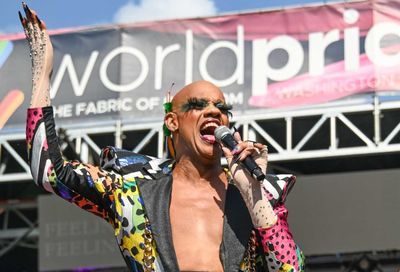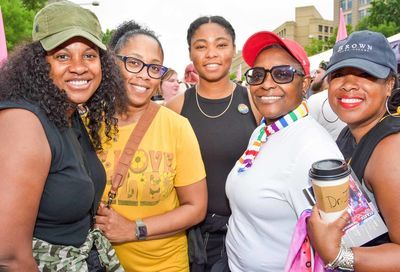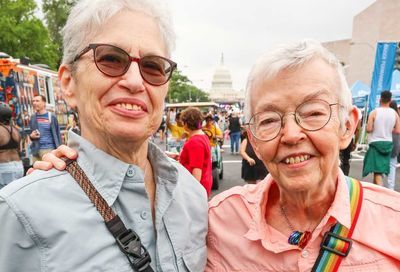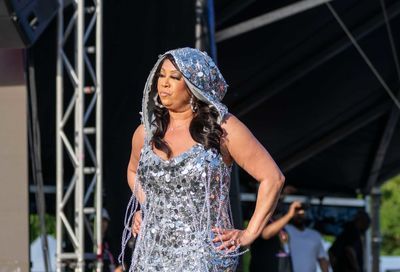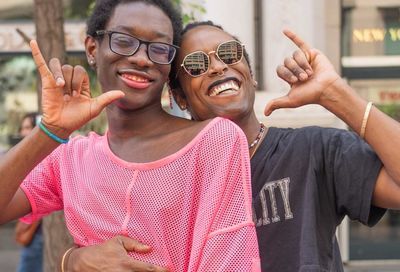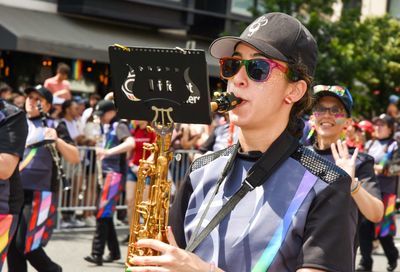Far From Over
Despite Many Advances, AIDS Remains a Threat to Communities at Risk
It’s been a long time since the first World AIDS Day in 1988. In those earlier days of the epidemic, it was one of many efforts — some desperate, some angry, some both — to focus a divided world’s attention on a disease that was devastating communities and threatening to devastate entire nations.
Things have changed, of course, as we approach World AIDS Day 2003. AIDS continues to ravage many of the world’s most vulnerable populations — many parts of Africa still struggle with the spreading virus, political turmoil and indifference often contributing to the problem. Although worldwide efforts have brought new, much-needed attention to the African epidemic, as well as burgeoning problems in places such as Asia, much remains to be done.
Here at home, advances in treatment have allowed many people living with HIV to do just that — live. Prevention has made strides in stemming the frightening spread the disease made in those early days. There are times when it seems as if AIDS has become just a problem — a chronic problem, but a manageable one nonetheless.
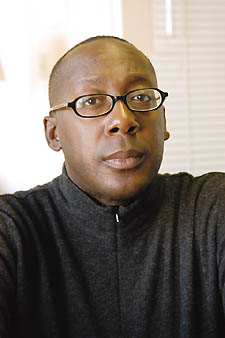 Cornelius Baker |
But that’s not the full picture. Treatment hasn’t cured the disease; many of those infected don’t know their status, or lack access to the drugs; and perceptions of a waning crisis may contribute to HIV become an entrenched part of life in many communities.
Whitman-Walker Clinic is one of many organizations in Washington that work on the front lines of the epidemic, with a history that goes back even before HIV emerged. Last week, Executive Director Cornelius Baker took a moment to address the ways in which AIDS remains very much a crisis for so many in the community, why the gay community should be both concerned about the future and proud of its leadership, and how the Clinic’s decision to charge fees on a sliding scale for some of its programs will impact its services.
METRO WEEKLY: In general, how do you feel about World AIDS Day as an annual event? Is it something that’s been a benefit to the Clinic, or is it something that people don’t pay that much attention to these days?
CORNELIUS BAKER: World AIDS Day is important because every opportunity to capture the public’s attention around the HIV epidemic is important. What makes World AIDS Day a little bit different is that people take time to reflect on the whole picture. We’re fortunate in Washington to be in a community that is concerned about HIV for 365 days of the year — a lot of attention is given to AIDS. A Kaiser Family Foundation report that just came out showed that HIV is the number one health concern across demographic groups in Washington, and a quarter of the population considers it the most important issue of all. It’s always present for us.
MW: Over the past few years there’s been an increasing focus from U.S. domestic groups on international HIV/AIDS issues by advocacy groups and the federal government. Has that made it more difficult to keep focus on the epidemic at a local level?
BAKER: Since the earliest days of the epidemic people from foreign countries have often come to the Clinic to look at it as a model. We’ve always had that partnership with the international community. We’ve also done some special projects — we helped set up a needle exchange program and a treatment facility for drug users affected by HIV in a small town southeast of Moscow, a project that ended in 2001. But we feel very strongly that the epidemic here in Washington is so great and of such a magnitude that we have to concentrate our efforts to do what we can do at home before we lend ourselves towards being more engaged globally. Washington has the highest epidemic in the country per capita. We also have rates for some populations, certainly for transgenders and for black gay men, that are akin to the rates of infection in Africa. It’s not hard for us to stay focused because of the work that we have to do.
MW: How do you describe the state of the epidemic in D.C.? Have we made progress? Are things getting better or worse?
BAKER: I think we’ve made progress, certainly since the early eighties. We’re not having nearly as many infections as we did then. But we have a continuing serious problem with the Washington epidemic, and when I speak of Washington, I mean the entire region. In Virginia, you’ve got an epidemic that is still predominately about gay men, and where white gay men are highly affected. In Maryland, with Montgomery and Prince George’s counties, you have an epidemic across demographic groups: Latinos, blacks, recent immigrants, are all being affected, and you have an epidemic among gay men. In the District we have an epidemic that is still highly concentrated in four Wards. In Wards 1 and 2 it’s very much a gay male epidemic, with black gay men, Latinos and white gay men affected. And in Wards 7 and 8, it’s a very heterosexual epidemic, women are increasingly more and more of the epidemic, as well as gay men who don’t always identify as gay men. In five to ten years we’ve gone from women [being] five percent of the epidemic to being ten percent.
We know that people are getting AIDS because they’re not getting health care — people are still getting tested [for HIV] just before they have an AIDS diagnosis. Whole parts of our city don’t have access to ongoing sources of health care, and as a result we have this rich stew of an epidemic affecting so many different populations, in so many different parts of the community, over a wide-ranging region. We have a real challenge here to get people into health care and keep them in health care, particularly in the southeast part of the city.
We also have a transitory population, so particularly in Wards 1 and 2, you have a fifty percent turnover in the gay male population every five years. You have people coming in all the time from places like Nebraska and Kansas — wonderful places, but also places where people have not gotten sexual health education. They come here right when they’re starting to burst into their sexual activity. Look at the colleges in our area and how many unintended pregnancies are occurring as just one harbinger of the type of risk these young people don’t really understand that they put themselves [in].
MW: Are there differences in the primary modes of transmission — sexual and injection drug use — among those areas?
BAKER: We have a higher injecting population in Wards 7 and 8, but increasingly the heterosexual women’s cases are less about direct drug. [But] we also have drug use in Wards 1 and 2. We certainly have shooting galleries along Sherman Avenue and Georgia Avenue. It’s also important for us to recognize that five to seven percent of cases among injection drug users are also gay men. When we think of injectors, we tend to think of them as only heterosexual, and that isn’t the case. We have the potential to see more of that as hard core crystal use begins to settle into our community, and we begin to see here some of the behavior that we see on the west coast, where crystal is as likely injected as it is snorted or smoked.
MW: Has Whitman-Walker seen an increase in injection crystal use?
BAKER: We’re seeing some. It clearly isn’t on the level of the west coast, but the staff is certainly reporting to me that they’re hearing more about injection. Crystal is something that we continue to monitor and are very concerned about because we think that the behaviors that the drug leads towards put people far more at risk for HIV.
MW: Why do you think so many people aren’t quite getting the message about crystal? Even if you think drug policy should be reformed, crystal use can seem pretty dangerous, particularly around HIV and AIDS issues.
BAKER: I think it’s a couple of reasons. Certainly, we’re taking a look at ourselves — while we do very good drug treatment, we haven’t done very good drug education. Part of the reason is that it’s hard to do effective drug education. You have to take a harm reduction approach, you cannot take a moralistic approach. We’re a community that, despite the prevalence of drug and alcohol use, does not feel comfortable speaking about drug use in a mature and adult way. We have to be able to say “If you do drugs, this is what you need to know” and give people the information they need to make appropriate decisions that will protect their health without moralizing about drug use. Otherwise, we leave people ignorant.
I cannot tell you how many people come to us strung out on crystal, and the first time [they did it] they were 22 or 24-years-old, and they were told, “Oh, this isn’t addictive.” So many of these people still believe that.
MW: Do you think people are disinclined to believe the messages that they get about any drugs because of fear-based stuff like the anti-marijuana campaigns?
BAKER: There’s a quantifiable difference between smoking marijuana and shooting up heroin. There’s a difference between having a cosmopolitan and doing crystal. Obviously for some people, they’re going to have a greater disposition to whatever addiction, and we have to be really mindful of that. But we also just cannot have people say, “Those people are anti-drug no matter what. I did it last week and nothing happened.” Because it’s not about that first time, it’s about the thousandth time. It’s about when you find that it’s possessing your life. We need to have much more clear, direct, non-judgmental communication around drug use.
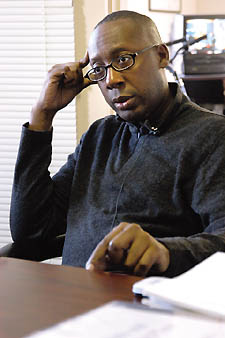 |
MW: Do there continue to be differences between the epidemics among black and white gay men?
BAKER: We see a number of different things right now, all of them of deep concern to us. It’s important that we recognize that there is still an epidemic of HIV among white men in our country. I say that because I think that we forget that thirty percent of all the cases in our country are among white men. We also assume that there’s a level of education that has pretty much ended the epidemic among white men. That’s not the case. We have to begin to really re-engage the white gay male community around what we’re seeing. We’re beginning to see a lot of white gay men re-engage in behaviors that are going to put them most at risk, ranging from crystal use to unprotected anal sex, particularly in the sex clubs. So I think we want to be mindful of that.
We have a very complex epidemic in the black gay male community. Part of it is black gay men who are out about being gay, and part of it is the non-identified gay men. There are women who are being infected by men who have not come to terms with their sexuality. We have to help people come to terms with being gay to understand that they don’t have to hide this, that they don’t have to put themselves and their partners at risk trying to prove this idea of masculinity that says if you wear a condom you’re a faggot. What is that about? We know that it is pervasive in the black community, and that it’s pervasive in the Latino community. We have to work to change that mind set. [And] it’s important to recognize that being on the down low is not just about black men who are afraid to be gay. You can go to any Virgnia truck stop and find a white married man who’s being very down low. That’s important because World AIDS Day is about fighting stigma and it’s becoming a sort of stigmatized thing that black men somehow are the only people unable to acknowledge their sexuality. We all have had to struggle through acknowledging our sexuality, and the important thing is to be able to create a world where people can talk about it in a healthier way.
[It’s also important to remember] the male-to-female transgender population, where we estimate that over fifty percent of the population has HIV. Because of society’s biases, it’s a community [where so many] are basically surviving off sex work. When was the last time you went to a K Street law firm and the receptionist was a transgender? When was the last time that you shopped at Hecht’s and the person behind the counter was transgender? Our society continues to discriminate against them in ways large and small. And since most are unemployed and uninsured, they’re buying their hormones off the street and they’re sharing needles. It is putting their lives at risk, both from bad hormones and spreading HIV. That’s a population we need to focus on more and talk more about, both HIV and the violence trangenders are at risk for, as we’ve seen all summer.
Another aspect of the epidemic is that as treatment has come into play, many of us — and certainly I include myself in that number — who have health insurance, who have access to medications, probably need a little bit less from the Clinic. There are thousands of people, however, who don’t have a private doctor, who don’t have insurance, who don’t qualify for Medicaid, and who have other needs, whether it’s housing, food, or other types of support. One of the challenges for the gay community is how we remain committed to helping people who are struggling against this really still horrific disease. I really do believe that helping to end the HIV epidemic is one of the most significant and great contributions that gay and lesbian people will have given to the world. That contribution will be as significant a testament of our leadership as in the last century the civil rights movement was for blacks. It’s of that magnitude, and we have to continue to lead the way. While we push for our equality, I think that the way we can best show the world who we are and shame them for all their hatred is for us to continue to show leadership and compassion in how we respond to this epidemic.
MW: Whitman-Walker has begun charging fees on a sliding scale for some services to help cover costs. The Clinic has had a number of difficulties with fundraising over the past few years — how are those efforts going today?
BAKER: Fundraising’s been a challenge. Certainly everyone who gets our direct mail knows that. People have read the headlines. We have a number of serious financial issues that we have to address. That being said, last year giving on a whole was down three percent [nationwide]. Giving to arts and health organizations was down over twenty percent. When I talk to colleagues [in other organizations] they’re all experiencing the same thing. So we can’t bitch and moan and say, “Oh, woe is Whitman-Walker Clinic.” We’re facing a greater crisis. Our social service organizations are not receiving public support at the time that we need the most. We have 3.5 million people who’ve lost their jobs just in the last four years. We have nearly fifty million people who are uninsured. At a time that we have more and more people coming to us, we’re getting less and less support. That led us to ask, how can we enhance our revenue to be able to provide for those who have no support? And so for people who come to us because of the quality of our care but who have means, can give something so that the person who’s making eight thousand or ten thousand a year — which are ninety percent of the people who come to us — can continue to get health care [from us].
MW: Are there particular areas that people with higher incomes access more than others?
BAKER: The STD clinic is a perfect example. A person may be insured, but their doctor doesn’t know they’re gay, and they think they have rectal gonorrhea. They don’t want to have to explain how they got rectal gonorrhea, and that’s why the come to us. [But] we don’t want people not to get an STD screening [because of a fee], so if you’re not getting screened because you don’t want to pay for it, come get screened — that’s far more important. But we hope that that’s not the choice that people will make. We’re hoping that they’ll say, “Yes I want to get screened, and I want to get screened in a gay facility where they’ll understand.”
MW: The Clinic’s HIV testing and counseling program has always asked for a donation if possible. How is this new sliding scale system going to work differently from that?
BAKER: The Clinic itself is going through a basic restructuring over the next year and a half, so our intake process will be changed. People will check in for their appointment, there’ll be a quick survey asking for some income information. The intake person will basically say, this is what it will cost for your services today if you’re able to afford this. We’re also going to be looking over the next year or two at opening up all our services for people who can pay, and particularly the LGBT community. For example, our dental services. Right now they’re only for people with HIV. But there are a people in the LGBT community who may be uninsured or underinsured, and who don’t have dental care. We want to make sure that we’re really living up to our mission in providing services to the LGBT community. We will not be able to make all of those services available for free because there’s very little grant support to help provide services to the LGBT community, and that’s unfortunate.
MW: Any final thoughts?
BAKER: There are things that we need to focus on. One is the basic political environment. We’ve talked about the private fundraising, but this year we’re looking at Congress for the first time cutting AIDS funding. And we’re only at the beginning of dealing with the nation’s deficit, the new budget rules, and the money that’s going to be flooding out from the tax rebates. So we’re potentially looking at two to three years of very serious challenge. We need to really rethink everything we do.
Support Metro Weekly’s Journalism
These are challenging times for news organizations. And yet it’s crucial we stay active and provide vital resources and information to both our local readers and the world. So won’t you please take a moment and consider supporting Metro Weekly with a membership? For as little as $5 a month, you can help ensure Metro Weekly magazine and MetroWeekly.com remain free, viable resources as we provide the best, most diverse, culturally-resonant LGBTQ coverage in both the D.C. region and around the world. Memberships come with exclusive perks and discounts, your own personal digital delivery of each week’s magazine (and an archive), access to our Member's Lounge when it launches this fall, and exclusive members-only items like Metro Weekly Membership Mugs and Tote Bags! Check out all our membership levels here and please join us today!




















